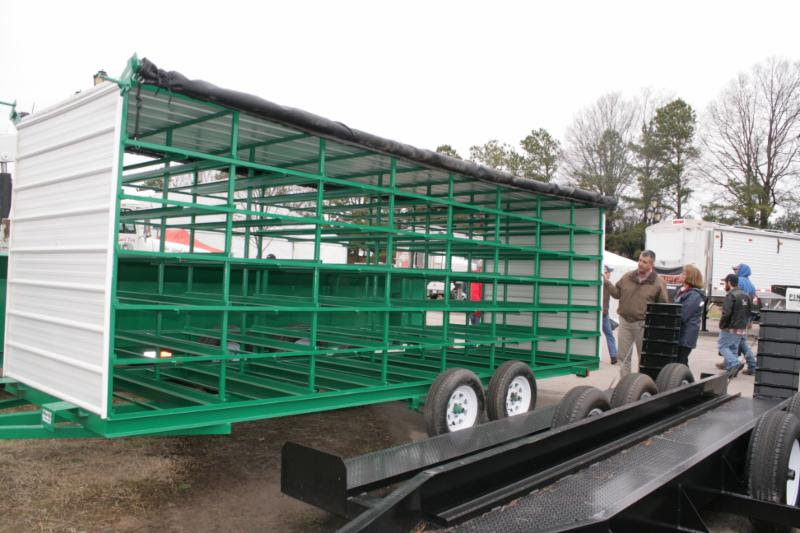
A newly seeded greenhouse near Raleigh, N.C.
The Type 14 crop is going to the field early. There was essentially no winter in Georgia and Florida, says J. Michael Moore, Georgia Extension tobacco specialist. "We had very few days when the temperature fell below 32 degrees." As a result, plants have been making fast progress in the greenhouse. "Some plants are running away from us. A few farmers may have begun transplanting already. I am expecting a lot of the crop to go to the field in the next two weeks."
No need to wait till April 7? The recommendation most years is to delay transplanting until April 7 or later because there tends to be less incidence of tomato spotted wilt virus after that date. But because of the weather, that may not be the case this season, says Moore. "Alternate host populations as well as thrips populations are already high."
If you plant early, though, Moore advises doing the best job possible of suppressing TSWV with Actigard and Imidacloprid.
No transplanting yet of flue-cured in North Carolina, but plants are progressing well in greenhouses. "It might be the best plant-growing season in many years," says Matthew Vann, specialist with the N.C. Extension tobacco team. "Thanks to the mild winter [until March 12], the N.C. flue-cured crop was seeded earlier than normal. Seeding is in fact substantially complete across the state, although there may be a few unseeded greenhouses remaining in the western Piedmont."
Variety distribution in N.C. flue-cured appears to be roughly the same as last year, says Vann, but there was a lot of interest in the new variety NC 938. "Growers looked long and hard at NC 938," he says. "It has strong black shank resistance and good yield potential." He thinks it will play a large part in N.C. flue-cured production in the future.
Just a few greenhouses have been seeded in Kentucky. "We may have a few plants breaking through but not many," says Kentucky Extension tobacco specialist. "Even though the 2016 season did not go well for many Kentucky growers, the feedback I am getting is that most of them are trying to grow another crop."
There doesn't seem to have been much shifting among varieties, except that a few more are planting the relatively new KT 215 because of its resistance to black shank and fusarium wilt, he says.
Should farmers sell finished products?
Two opinions
The U.S. Tobacco Cooperative Inc. (USTC) in Raleigh, N.C., recently purchased a N.J. cigarette manufacturer, King Maker Marketing Inc. of Paramus, through its consumer products division, Premier Manufacturing of Chesterfield, Mo. The acquisition added four brands to USTC's consumer products portfolio.
"Each of the brands has a solid sales history and consumer following," said USTC Chief Executive Officer Stuart Thompson. "The addition of these nationally recognized brands to our portfolio allows us to increase market share in our category and expand distribution due to our larger sales and marketing organization."
Earlier in 2016, USTC announced that Premier is now supplying Circle K convenience stores in 40 states with its cigarette brand Traffic.
Soon after the price support program ended, USTC (formerly Flue-Cured Stabilization) tried marketing some of its farmers' leaf as finished products. The big step was purchasing a cigarette factory in Timberlake, N.C. About the same time, it bought Premier, and now it has bought King. All
USTC brand cigarettes are in the value category, led by 1839, whose name commemorates the discovery of the bright curing process. The results have been good. As one source within the cooperative says, "We get high-quality tobacco from our growers, we make that leaf into a very tasty product, then we sell it at a price that is a value to consumers. The packaging and price bring them in. But the reason they come back is because they think the product tastes good."
The burley co-ops, on the other hand, focus entirely on leaf. The Burley Stabilization Corporation (BSC) cooperative in Springfield, Tn., experimented with manufacturing products for a few years but found it was just not right for them, says BSC leader Daniel Green. "We found that finished products were not the direction we needed to go," says Green. "We sold our interest in the finished product business so that we can fully focus on our leaf tobacco business. The way we look at it, there are people that are really good at finished tobacco products. We want to supply them with the best quality leaf possible and are not interested in trying to compete with them."
And at Burley Tobacco Growers Cooperative Association in Lexington, Ky., there was never much interest in manufacturing finished tobacco products, says Steve Pratt, general manager. "We concentrate on contracting, processing and selling leaf tobacco," he says.
GAP TRAINING EVENTS
KENTUCKY (Burley/Dark)
March 28, 6 PM. Laurel County Extension Office, 200 County Extension Rd., London KY. Contact Glenn Williams at gwilliam@uky.edu or 606 864 4167.
March 30, 6 PM. Warren County Extension Office, 3132 Nashville Rd., Bowling Green KY. Contact Joanna Coles at jcoles@uky.edu or 270 842 1681.
MARYLAND/PENNSYLVANIA (All types)
Note: The contact for all MD-PA meetings is Jeff Graybill, Pennsylvania Extension, Lancaster County, 717-394-6851.
March 27, 9 AM. Ira Hertzler Farm, 28379 Thompson Corner Rd., Mechanicsville, MD.
March 28, 9 AM. Garden Spot Fire Rescue, 369 East Main St., New Holland PA.
March 28, 1 AM. Garden Spot Fire Rescue, 369 East Main St., New Holland, PA.
March 29, 9 AM. 172 South Lime St., Quarryville, PA.
March 30, 9 AM. Turbotville Community Hall, 41 Church St., Turbotville, PA.
March 29, 1 PM. 172 South Lime St., Quarryville, PA.
|
 |
|
 |
 |
|
 |







